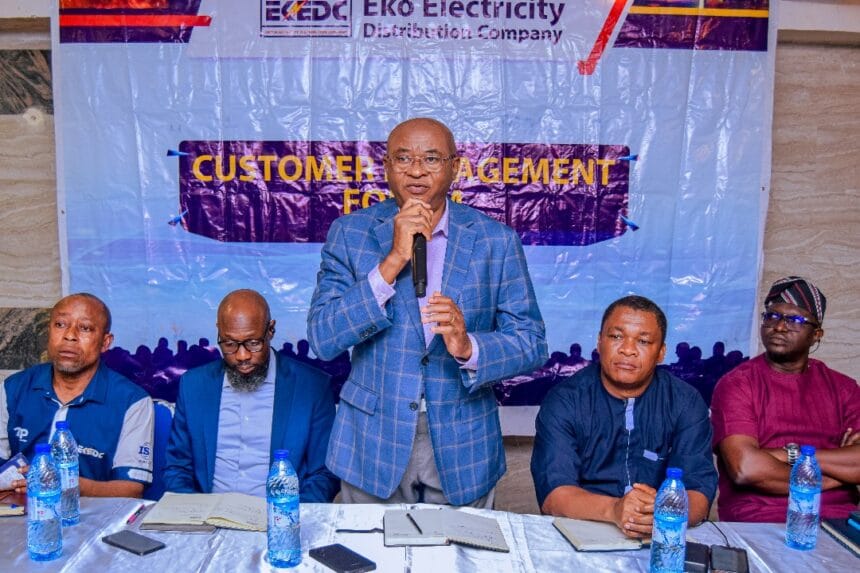… announces plan to implement ERP for fully automated metering process to combat procurement, installation delays
Oredola Adeola
Eko Electricity Distribution Company (EKEDC) has assured customers in the Oko-Afo and Badagry areas under its Agbara District of its commitment to addressing the state of power, with a dedicated team assigned to investigate issues with the Badagry 11KV feeders linked to the 2x15MVA transformer at the injection substation.
In a follow-up, the DisCo has urged customers in the Agbara District to settle their outstanding electricity bills, emphasizing that adequate resources are essential to improving infrastructure and delivering better service.
He reiterated that power supply improvements depend on the commercial viability of areas, urging customers to settle their outstanding bills to ensure better service.
Esenwa explained that despite customer payments, the company does not have full control over its collections, as 100% of dues are deducted monthly by NBET and Market Operators (MO), leaving the DisCo with limited resources for operations.
He emphasized that customer payments are crucial for operational performance, stating, “Sometimes, what we collect isn’t enough to cover the cost of transformers and other infrastructure needed across the distribution network.”
Addressing complaints of poor supply in the Agbara District, the CFO noted that many issues arise in areas where customers are not settling their bills.
“We expect them to pay their bills so we can serve them better. We need the resources to do business,” he added.
On the purchase of transformers, he acknowledged that demand far outweighs the resources available to the DisCo, contributing to delays.
However, he assured customers, “We are working on improving the pace of transformer delivery, but we prioritize areas where customers are up to date with their payments.”
Regarding specific issues in the Oko-Afo and Badagry axis, Engr. Henry Okoh, EKEDC’s Head of Distribution, assured customers that the company will investigate issues with the Badagry 11KV feeders connected to the 2x15MVA power transformer at the injection substation.
“There may be localized issues affecting supply, and we will address them promptly,” he stated.
Engr. Gbadebo Akinyede, Head of Metering Services at EKEDC, has explained that most delays in the installation of prepaid meters to customers after they have paid often occur when agents use their own details for registration.
He has therefore urged customers to apply for meters directly via the company’s website, ensuring that personal details like phone numbers and emails are provided.
“At the point of meter release, important information will be sent directly to the customer’s email, and installers will only contact the phone numbers registered,” he explained.
Engr. Gbadebo Akinyede announced that EKEDC is set to introduce a fully automated metering process to address delays in the installation of prepaid meters.
“We are implementing Enterprise Resource Planning (ERP) to automate the entire metering process, which will significantly speed up operations,” he said.
He further explained, “This full automation will streamline approvals from the District, Zonal, and Account Generation processes, ensuring quicker and more efficient meter installations.”
Addressing customer concerns about metering delays, he added, “EKEDC is installing meters on poles to discourage meter bypass, and all payments for meters will be refunded over 120 months through energy tokens, as directed by NERC.”
On the upcoming migration to STS 2-compliant meters, Engr. Akinyede advised customers to be ready for the transition.
“From October 31, when loading tokens, customers will receive three sets of numbers.
“The first two will migrate their meters from STS 1 to STS 2, while the third will be for energy recharge. This is a one-time process,” Akinyede clarified, urging customers to ensure their meters are compliant.
Engr. Benson, Business Manager for the Agbara-Badagry axis, explained that power supply to customers is based on commercial justification, stating, “We are working to engage with customers to increase payments, making it more viable for DisCos to invest in infrastructure.”
He clarified that the supply customers receive, and their band classification depend on the number of hours of power they enjoy on the feeders.
“Some customers were downgraded in band classification due to issues with the feeder a few months ago, and the Nigerian Electricity Regulatory Commission (NERC) automatically adjusted these bands based on the actual supply at the time. As supply improves, we will restore these customers to their original Band C,” he added.
Mrs. Shomide Opeyemi, Chairman of Idomita/Ilogbo/Oko-Afo, commended EKEDC for organizing a forum that allowed customers to voice their concerns, stating, “I am satisfied with this engagement, and we will educate our community members on the importance of paying their bills to support EKEDC’s efforts.”
She highlighted the need for timely bill payments to prevent sabotage of the DisCo’s services.
Festus Nweka, Chairman of the Consumer Consultative Forum for EKEDC’s Agbara District, echoed this sentiment, saying, “This forum has been a valuable platform for customers to learn and address issues affecting them. EKEDC should continue these engagements to foster better synergy with customers.”
He urged EKEDC to enhance public awareness of service upgrades and simplify the process of obtaining prepaid meters, which he noted is a pressing concern for 90% of customers.
Engr. Niyi Olufihinmi, President of the Resident Association, OPIC Estate, emphasized the need for customers to pay for what they use, adding, “Customers must understand that electrical equipment can experience faults, but this should not lead to non-payment of bills.”
On rising cases of energy theft and vandalism, he urged communities to take responsibility for securing transformers and electrical infrastructure, stating, “Security is everyone’s responsibility, not just EKEDC’s.”



